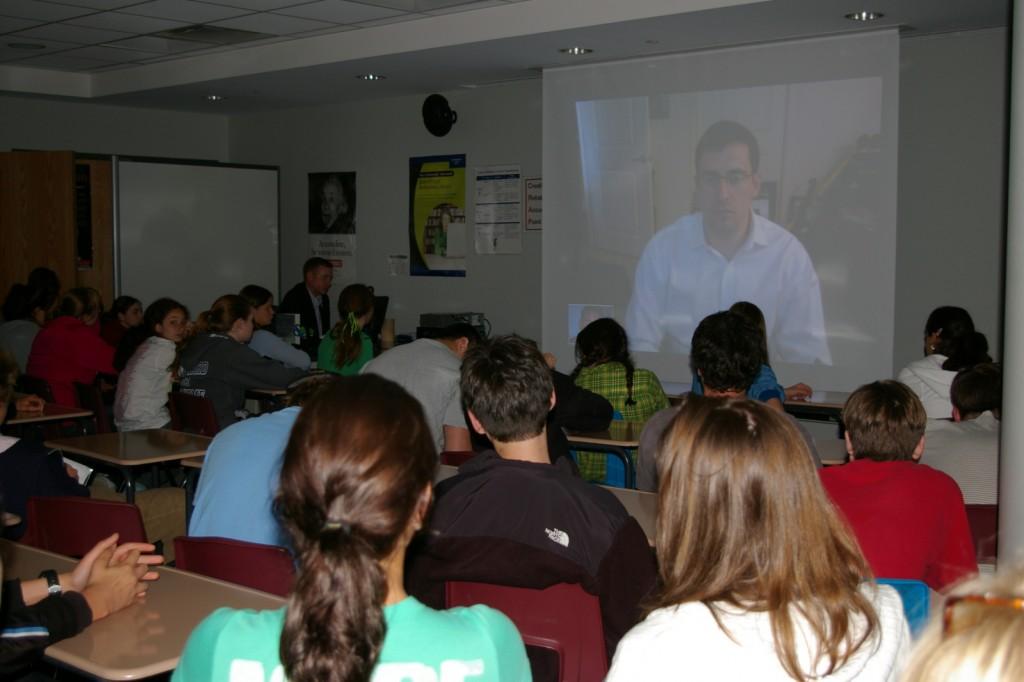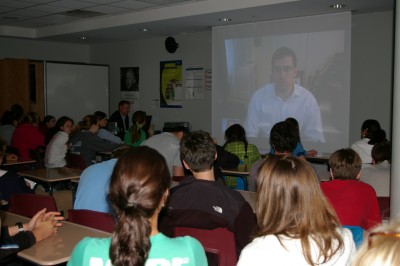“You’re going on a journey here,” said English teacher, Dan Geraghty, when the program began, and more than 70 students and a number of staff members did, as they witnessed Staples first Skype “chat” which was held with author Craig Mullaney.
On April 22 students from Geraghty’s sophomore English 2A, B and contemporary American literature classes, as well as Christina Richardson’s speech class gathered in one of the library classrooms and watched as Geraghty conducted a question and answer session with the author.
Mullaney is the author of “The Unforgiving Minute: A Soldier’s Education” a true account of what Mullaney faced after graduating from WestPoint, Ranger School and Oxford University and then deploying to Afghanistan.
Mullaney’s “chat” was designed to provide another perspective on a book the students read in class entitled, “The Things They Carried” by author Tim O’Brien. This novel is a fictional account based on O’Brien’s personal experiences in the Vietnam War.
The beginning of the “chat” focused on building off of students’ understanding of the title “The Things They Carried,” addressing not only the physical, but also emotional side of war.
Mullaney said that from his experience, the physical baggage includes equipment, body armor, helmet and a backpack (which also has food and clothing).
But “as a leader there is so much more that you carry on your shoulders,” said Mullaney, delving into discussion on the intensity of war and the understanding of the immense responsibility that comes with positions of authority.
Students found his story and connection to literature compelling as well.
“On a more personal level I think he went into detail about what he carried…reading his personal story will help us understand more [about The Things They Carried],” said Justine Abelow ’11.
Max Samuels ’11 also spoke about the connection he felt that was made between the text and Mullaney’s presentation.
“It really gave me a different perspective of war…information that you wouldn’t get except from someone who was there,” said Samuels.
At that point the “chat” turned a little more lighthearted. Having just discussed Mullaney’s involvement as a former member of the current administration’s Nation Security Council, his phone rang.
At that point Geraghty jokingly asked, “Is it Barack?” and received many laughs from the crowd.
Use of Technology
In what most people agree is an increasingly digital age, technology proved to be very effective. This particular program, Geraghty explained, came together as a result of communication over Facebook.
“Not having Facebook now is like ten years ago when people said they weren’t going to get a cell phone,” said Geraghty.
After attempting to establish contact with Mullaney through his website, press secretary and other outlets, which proved fruitless, he turned to Facebook and was able to establish contact in one evening.
Despite, regularly cited problems with sites such as Facebook, Geraghty said that its social networking capability has the ability to be used effectively and was done so in this case, but jokingly noted that he has no desire to establish contact with any of his students through the site.
Skype, another Internet site with messaging capability and video output, was the other crucial technological element to this production and with a webcam Geraghty and Mullaney were able to speak while the students watched on the curtain screen.
“I think using Skype was a very creative way to do the interview…it was a fantastic way to get in touch with someone so articulate,” said Abelow.
Abelow also explained that the interview probably would not have been able to be done in any other way, since Mullaney was not able to make the trip to Staples.
Geraghty also touched on the issue of accessibility.
“It was a way to get everyone to experience this without having to leave class…what it has taught me is that the technology is out there,” said Geraghty.
But, as a rule of thumb for technology he said, “use it (technology) when it fits, not just because it is there.”
Educational Significance
The “chat” also centered on the school system, both what students at Staples are focusing on and what Mullaney learned from his educational experiences.
Geraghty focused during the interview on one particular quote from “The Unforgiving Minute: A Soldier’s Education” which reads, “West Point taught me how to answer questions, but Oxford taught me how to ask them.”
Explaining that Staples is “a school whose goal is to enhance and explore critical thinking” Geraghty asked Mullaney to comment on the differences in educational methods between his schools.
He explained that WestPoint’s focus on order, deadlines and conduct worked in complete contrast to his education at Oxford University.
“Oxford forced me to take command of my own education,” said Mullaney. He added that he was allowed educational and personal freedom that he did not have at WestPoint.
However, his WestPoint education has been equally as valuable to him teaching him other important lessons for personal growth.
“I visited the “usual suspects” in regards to colleges, but something was missing…not a single one had asked anything of me…I wanted to be part of something larger than me.” In the end he said he has found that “responsibility comes before privilege” and feels that this is a lesson all people can practice more often in life, providing its own type of critical thinking.














































